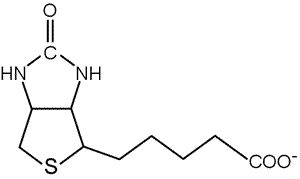biotin

Biotin molecule.
Biotin is a vitamin (B7) of the vitamin B complex; chemical formula C10H16O3N2S. Biotin is essential to the body, but is needed in only minute quantities. Foods especially rich in biotin include liver, peanuts, dried beans, egg yolk, mushrooms, bananas, grapefruit and water melon. It is also synthesized by intestinal bacteria.
Biotin is vital for the activities of various enzymes involved in the breakdown of fatty acids and carbohydrates and for the excretion of the waste products of protein breakdown. Specifically, it is a cofactor for carboxylase enzymes such as pyruvate carboxylase and acetyl CoA carboxylase, which add a carboxyl group to their substrates.
Deficiency of biotin may occur during prolonged treatment with antibiotics or sulfonamide drugs. It may also result from long-term high consumption of raw egg whites, which contain a substance that interferes with the intestinal absorption of biotin. The main symptoms of biotin deficiency include weakness, tiredness, poor appetite, hair loss, depression, inflammation of the tongue, and eczema.


